A Scandal in Paris Blu-ray Movie
HomeA Scandal in Paris Blu-ray Movie 
Cohen Media Group | 1946 | 100 min | Not rated | No Release Date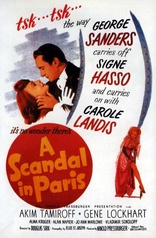
Price
Movie rating
6.4 | / 10 |
Blu-ray rating
| Users | 0.0 | |
| Reviewer | 3.5 | |
| Overall | 3.5 |
Overview
A Scandal in Paris (1946)
A rediscovered American classic from legendary director Douglas Sirk (Imitation of Life, Written in the Wind), A Scandal in Paris is an irresistibly clever melodrama that observes the romantic and criminal pursuits of the debonair thief Francois Eugene Vidocq (George Sanders). Opening with Vidocq's birth in a French prison, A Scandal in Paris follows the cocksure criminal as he befriends a loyal pickpocket (Akim Tamiroff) and climbs to the height of Parisian society through deception, seduction and his devilishly clever wit. But once he becomes the chief of police and perpares to execute the heist of his career, he finds himself vulnerable to the charms of a quiet young woman. One of Sirk's first film after emigrating to America, A Scandal in Paris (aka Thieves Holiday) bears a distinctively European sensibility akin to the risque comedies of Ernst Lubitsch and Billy Wilder. At the same time, it foreshadows the calculated melodrama and emotional extremes that would make Sirk famous in films such as Magnificent Obsession and All that Heaven Allows.
Starring: George Sanders (I), Signe Hasso, Carole Landis, Akim Tamiroff, Gene LockhartDirector: Douglas Sirk
| Romance | Uncertain |
| Crime | Uncertain |
| Comedy | Uncertain |
| Adventure | Uncertain |
Specifications
Video
Video codec: MPEG-4 AVC
Video resolution: 1080p
Aspect ratio: 1.30:1
Original aspect ratio: 1.37:1
Audio
English: LPCM 2.0
Subtitles
English SDH
Discs
Blu-ray Disc
Single disc (1 BD)
Playback
Region A (B, C untested)
Review
Rating summary
| Movie | 3.5 | |
| Video | 4.0 | |
| Audio | 3.0 | |
| Extras | 1.5 | |
| Overall | 3.5 |
A Scandal in Paris Blu-ray Movie Review
Because Bohemia has its own scandal.
Reviewed by Jeffrey Kauffman September 21, 2016Note: This film is currently available as part of
Two Films By Douglas Sirk.
Mention the name Douglas Sirk to virtually any discriminating cineaste, and chances are he or she will almost instinctively think of Sirk’s 1950s
era
melodramas like All I Desire, Magnificent Obsession, All That Heaven Allows, There's Always
Tomorrow, Written on the Wind, The Tarnished Angels and Imitation of Life. While Sirk’s sudsy mid-century efforts are probably always
going
to be his best remembered contributions to the annals of American film (for better or worse), these hyperbolically emotional romances are of
course
only part of Sirk’s long and surprisingly varied filmography. Having established himself first as a stage director and then later as a film director
in
Germany, he ultimately moved to the United States not because he was Jewish (as was the case with so many European emigrés who
matriculated
to
the American film industry during this era), but because his wife at the time was. Sirk’s first American feature was Hitler’s Madman, a
film
which certainly had its own hyperbolic tendencies even if it was a supposedly historical account of the assassination of Reinhard Heydrich rather
than
the roiling saga of star crossed lovers. Cohen Film Collection is now offering two relatively early Sirk films that followed in quick succession
after
Hitler’s Madman, 1946’s quasi-biography A Scandal in Paris and 1947’s quasi-noir Lured. What’s interesting about both
of
these films, especially for those who are only acquainted with the histrionics of Sirk’s fifties’ oeuvre, is how light and even comical they
often
are.
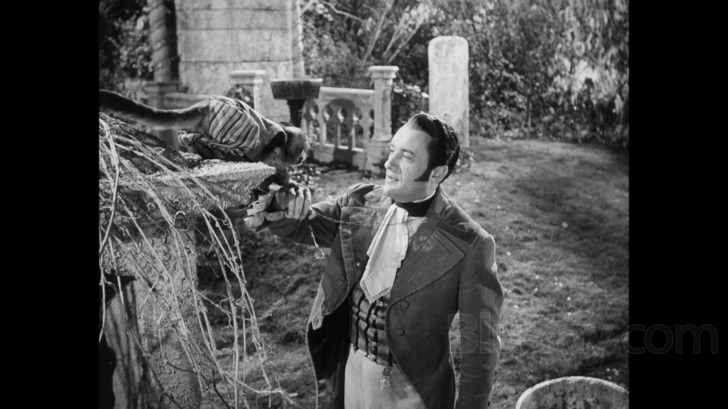
It’s perhaps a little odd that the name Eugène François Vidocq isn’t better recognized, for this late 18th to mid 19th century Frenchman has one of the more fascinating life stories imaginable, one which provides at least the basis for the highly fictionalized A Scandal in Paris. Vidocq began his “professional” life as a criminal, ending up in prison (repeatedly) as early as his teen years (the first time evidently at the hands of his father who wanted to teach him a lesson, in a vignette that may strike some Hitchcock fans as familiar). Vidocq had something approaching a crisis of conscience as he approached middle age (meaning his mid-thirties), and he reinvented himself rather dramatically, first as a police informant and then later as an actual detective. Vidocq is credited as being the father of “modern” criminology, as well as creating the niche that would later be known as the private detective. Obviously, there’s a lot in Vidocq’s life that would make for an exciting film, but Ellis St. Joseph’s screenplay adorns Vidocq’s (evidently ghost written) memoirs with so much fictional baggage that some of the visceral intensity of Vidocq’s amazing life story gets buried in the process.
That fictionalization begins right off the bat as voiceover by Vidocq (George Sanders) offers factually false information on Vidocq’s parentage and childhood. The film presents Vidocq as a rogue from the get go, which is probably more or less true, but skips over his young years with a dissolve that features Vidocq “fully formed” as an adult languishing away in prison with an acolyte of sorts named Emile Vernet (Akim Tamiroff). (Commentator Wade Major suggests these two can be thought of as a sort of Don Quixote and Sancho Panza pair, which, considering Tamiroff’s general appearance and deportment, is probably as apt a comparison as any.) With a little help from the time honored tradition of hiding a file in a cake, Vidocq and Vernet are able to escape, at which point their “adventures” really begin.
A seemingly bizarre vignette finds Vidocq and Vernet posing for an artist (Fritz Leiber) who is painting a mural of Saint George and the dragon for a church, with Vidocq standing in for the saint and Vernet rather comically becoming the dragon. This moment ripples throughout the film in a couple of interesting ways, albeit somewhat later. The immediate upshot is that the criminal duo suddenly have a horse with which to make a speedy exit, which allows them to get to Vernet’s well established criminal family. Vernet’s Uncle Hugo (Vladimir Sokoloff) suggests the two should hide out in the army, which he’s arranged for them to do, and the film then segues again to a somewhat later timeframe, where Vidocq, now masquerading as a lieutenant named Rousseau, meets voluptuous cabaret singer Loretta (Carole Landis). It’s not exactly a match made in heaven, for while Loretta’s eyes are fixed on Vidocq (or “Rousseau”, as the case may be), Vidocq is more focused on some jewels Loretta has, gems he later purloins.
More jewels ultimately capture Vidocq’s attention when he helps an aging Marquise (Alma Kruger) capture her loose pet monkey. (This same monkey plays a “featured role” in the 1941 Paramount farce World Premiere, where it’s seen frantically struggling to remove Frances Farmer’s black wig in one unintentionally funny scene.) That interest brings Vidocq into contact with a pretty young thing relative of the Marquise named Therese (Signe Hasso), who just so happens to have already fallen in love with the likeness of Vidocq as Saint George at the church. Vidocq and Vernet actually do purloin more jewels, but it’s here where Vidocq suddenly has a not especially well motivated change of heart.
It’s also here where A Scandal in Paris has a tonal change as well, and one that gives the film a certain brusque quality as it almost careens to a series of tragic ends for at least a couple of major characters. I’m not quite sure whether this third act really fits organically with the somewhat lighter, breezier first two sections, but it certainly sends the film off on a fascinating detour that gives these probably intentionally surface deep characters a little emotional resonance. The performances throughout A Scandal in Paris are charming and effective, even if the screenwriting is occasionally hackneyed. Sirk shows a few stylistic flourishes as well, as in one sequence where he frames things as a voyeur peeking through a keyhole. Some Francophiles may know that the central character’s story was told, again in a highly fictionalized manner, in the 2001 film Vidocq (note that the link points to a German disc). Some enterprising filmmaker might actually want to tell the real story somewhere along the way, for as they say, truth is stranger (and at times more interesting) than fiction.
A Scandal in Paris Blu-ray Movie, Video Quality 
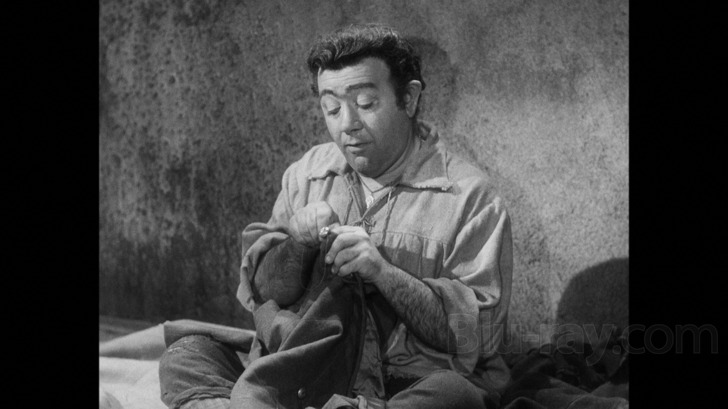
A Scandal in Paris is presented on Blu-ray courtesy of Cohen Film Collection with an AVC encoded 1080p transfer in 1.30:1. The "fine print" on the back of the keepcase insert states that this was culled from "a new HD transfer from an archival 35mm interpositive." The results here are largely commendable, albeit with a few minor issues to address. While contrast is generally very strong, it encounters occasional moments of looking anemic, sometimes understandably when opticals like dissolves are involved, though not always. Detail levels and fine detail are very good to excellent, and in some close-ups, almost tactile (look at the fabric textures surrounding Vidocq's face in screenshot 6 for one notable example). Sharpness and clarity are also occasionally variable, with some scenes looking relatively fuzzy and less detailed than the bulk of the presentation (see screenshot 15). Grain resolves naturally and gives the presentation a nicely organic appearance.
A Scandal in Paris Blu-ray Movie, Audio Quality 
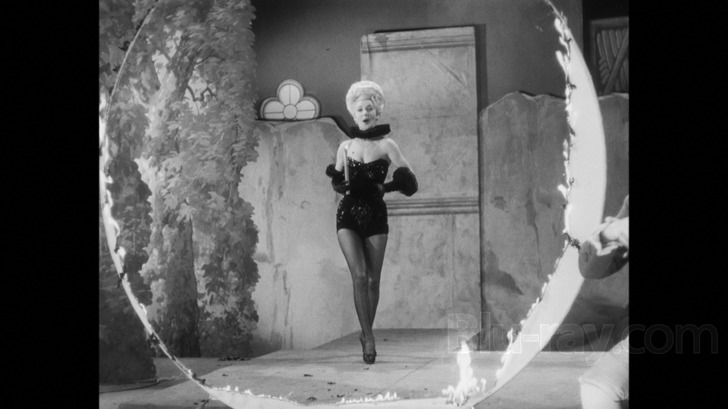
Unfortunately A Scandal in Paris' LPCM 2.0 mono track can't overcome some of the limitations and damage to the source elements. From the opening theme music, there's quite a bit of popping and crackling going on, and a boxy, compressed sound stays with this film even when outright damage isn't on display. While there's no problem actually hearing any dialogue, whatever restorative efforts were applied to this soundtrack weren't able to completely ameliorate some of the hurdles this aged track evidently had.
A Scandal in Paris Blu-ray Movie, Special Features and Extras 
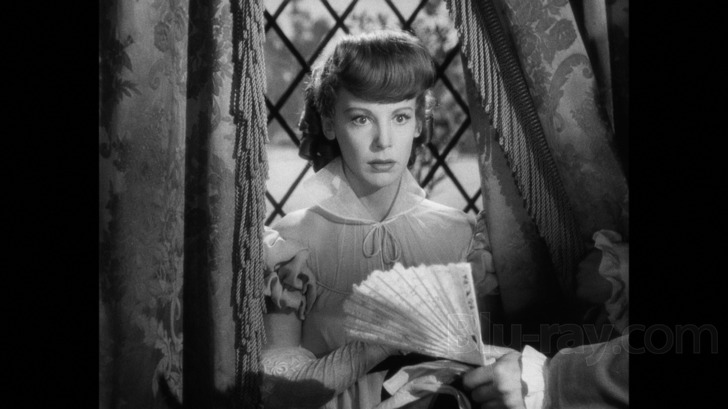
- Audio Commentary by Film Critic Wade Major
- 2016 Re-Release Trailer (1080p; 00:58)
A Scandal in Paris Blu-ray Movie, Overall Score and Recommendation 
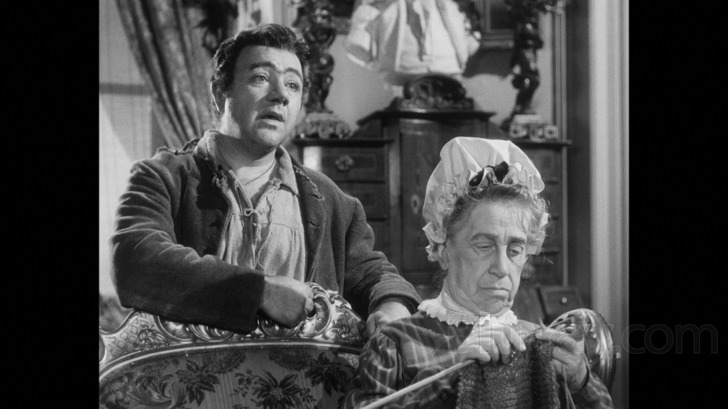
A Scandal in Paris coasts on the considerable charisma of Sanders, with able support from a large and colorful supporting cast, but it wavers a bit uneasily between its lighter elements and what ultimately turns out to be a rather, well, Sirkian melodramatic aspect as things wend their way to their conclusion. Vidocq's life story is fascinating, but A Scandal in Paris plays so fast and loose with the "facts" that it's basically a work of fiction. The video restoration is quite impressive, with the audio restoration not quite matching it in excellence. Recommended.
Similar titles
Similar titles you might also like
(Still not reliable for this title)

Bluebeard's Eighth Wife
1938

Irma la Douce
1963

Midnight
1939

Another Thin Man
Warner Archive Collection
1939

Harry and Walter Go to New York
Limited Edition to 3000
1976

Desire
1936

The Lavender Hill Mob
1951

Wild Target
2010

The Man Who Was Sherlock Holmes
Der Mann, der Sherlock Holmes war / Two Merry Adventurers
1937

The Perfect Furlough
1958

Murder, He Says
1945

Strawberry Blonde
Warner Archive Collection
1941

Mad Dog and Glory
1993

The Three Musketeers
1973

Golden Earrings
1947

Skidoo
1968

Bedtime Story
1964

A Shot in the Dark 4K
1964

The Wrong Arm of the Law
1963

What's New Pussycat?
1965